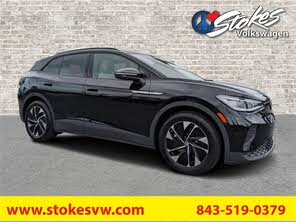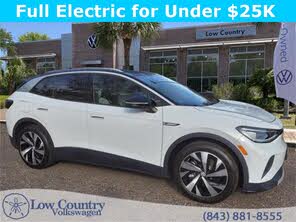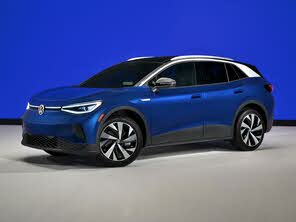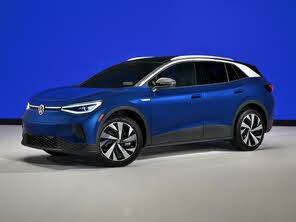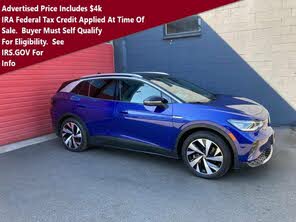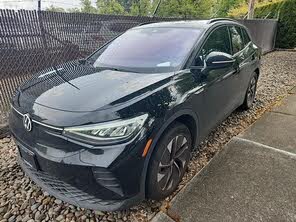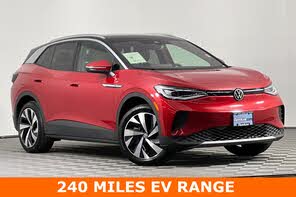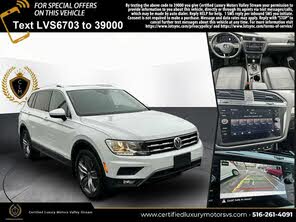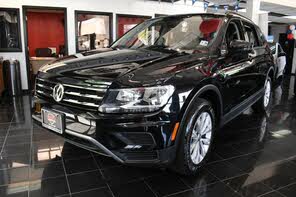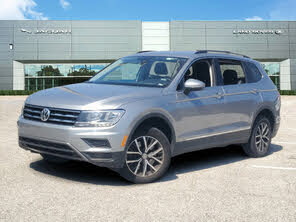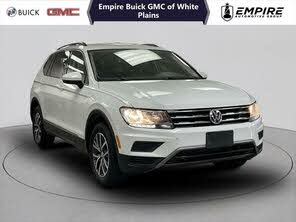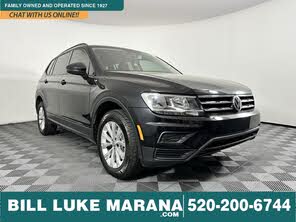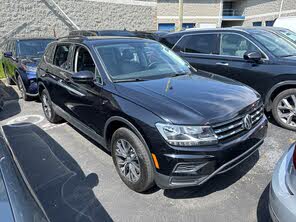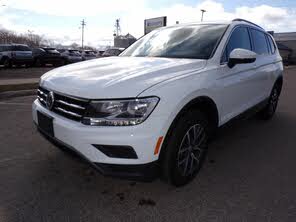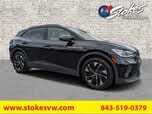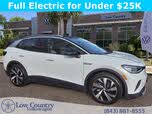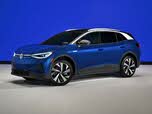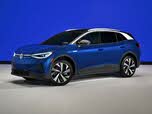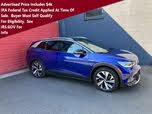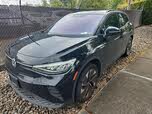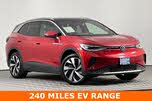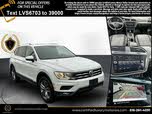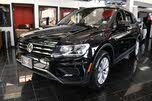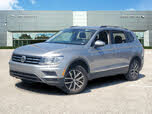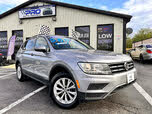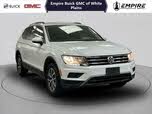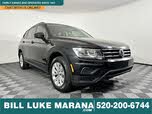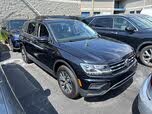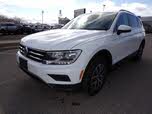2020 Volkswagen Tiguan vs 2021 Volkswagen ID.4
Overview | |
MSRP$24,945 | MSRP$39,995 |
Average price$20,842 | Average price$24,705 |
Listings1451 | Listings475 |
Ratings & Reviews | |
User Reviews | User Reviews |
Expert reviews7.7 out of 10 | Expert reviews7.3 out of 10 |
Pros
| Pros
|
2020 Volkswagen Tiguan Reviews SummaryThe Volkswagen Tiguan is one of only two compact crossover SUV��’s that currently offer third-row seating. (And the other is the hopelessly outdated Mitsubishi Outlander.) To fit the extra pair of surprisingly spacious seats, VW made the Tiguan much larger than average for its competitive set—which suits a vehicle that fills big shoes in VW dealerships. With five trim levels and prices that stretch from just under $26,000 to a bit over $40,000, the Tiguan is the German brand’s best-selling vehicle in the U.S. | |
2021 Volkswagen ID.4 Reviews SummaryThe “Dieselgate” emissions scandal forced Volkswagen to double down on electric cars, and now we’re finally seeing the first result of that: the 2021 Volkswagen ID.4 electric crossover. VW has made an electric car before, but its last attempt, the e-Golf, was built to satisfy emissions standards, not rack up sales. It was barely advertised, and it was sold only in certain states. That’s not the case with the ID.4, which will be available nationwide and will even be built in Tennessee starting in 2022. Volkswagen views the ID.4 as a rival not to other EVs, but to mainstream gasoline vehicles like the Honda CR-V and Toyota RAV4. Being late to the party means there are already several other EVs trying to coax new-car buyers away from internal combustion, however. If you want a reasonably-priced EV, the Nissan Leaf, Hyundai Kona Electric, and Kia Niro EV already exist, and General Motors just announced the 2022 Chevrolet Bolt EUV—a new variant of the Chevy Bolt EV with a crossover body style similar to the Volkswagen. We tested an ID.4 1st Edition, which commemorates the car’s launch, and an ID.4 PRO S with all-wheel drive (AWD). The 1st Edition is a limited-edition model that has already sold out, but it’s mechanically identical to the ID.4 Pro S AWD, albeit with power sent only to the rear wheels. | |
No video found | |
Popular Features & Specs | |
Engine2.0L 184 hp I4 | Engine201 hp Electric |
Drive TrainFWD | Drive TrainRWD |
Seating Capacity7 | Seating Capacity5 |
Horsepower184 hp @ 4400 rpm | Horsepower |
EV Battery Capacity | EV Battery Capacity82 kWh |
MPG City22 | MPG City104 |
MPG Highway29 | MPG Highway89 |
Battery Charge Time (240V) | Battery Charge Time (240V)8 hours |
Engine | |
Engine Name2.0L 184 hp I4 | Engine Name201 hp Electric |
Torque221 lb-ft @ 1600 rpm | Torque |
Horsepower184 hp @ 4400 rpm | Horsepower |
Battery Charge Time (240V) | Battery Charge Time (240V)8 hours |
DrivetrainFWD | DrivetrainRWD |
Fuel Economy | |
EV Battery Capacity | EV Battery Capacity82 kWh |
MPG City22 | MPG City104 |
MPG Highway29 | MPG Highway89 |
Interior | |
Seating Capacity7 | Seating Capacity5 |
Safety | |
Front Crash Overall4 | Front Crash Overall5 |
Side Crash Overall5 | Side Crash Overall5 |
Dimensions & Capacity | |
Cargo Space12.0 cu ft | Cargo Space30.3 cu ft |
Curb Weight3757 lbs | Curb Weight4517 lbs |
Height66.3 in | Height64.4 in |
Length185.1 in | Length180.5 in |
Width72.4 in | Width72.9 in |
Wheelbase109.8 in | Wheelbase108.9 in |
Maximum Payload1124 lbs | Maximum Payload1347 lbs |
Number of doors4 | Number of doors4 |
Maximum Towing Capacity1500 lbs | Maximum Towing Capacity |
Overview | ||
MSRP | $24,945 | $39,995 |
Average price | $20,842 | $24,705 |
Listings | ||
Ratings & Reviews | ||
User reviews | 4.6 | 4.7 |
Expert reviews | 7.7 out of 10Read full review | 7.3 out of 10Read full review |
Pros & cons | Pros
| Pros
|
Summary | The Volkswagen Tiguan is one of only two compact crossover SUV’s that currently offer third-row seating. (And the other is the hopelessly outdated Mitsubishi Outlander.) To fit the extra pair of surprisingly spacious seats, VW made the Tiguan much larger than average for its competitive set—which suits a vehicle that fills big shoes in VW dealerships. With five trim levels and prices that stretch from just under $26,000 to a bit over $40,000, the Tiguan is the German brand’s best-selling vehicle in the U.S. | The “Dieselgate” emissions scandal forced Volkswagen to double down on electric cars, and now we’re finally seeing the first result of that: the 2021 Volkswagen ID.4 electric crossover. VW has made an electric car before, but its last attempt, the e-Golf, was built to satisfy emissions standards, not rack up sales. It was barely advertised, and it was sold only in certain states. That’s not the case with the ID.4, which will be available nationwide and will even be built in Tennessee starting in 2022. Volkswagen views the ID.4 as a rival not to other EVs, but to mainstream gasoline vehicles like the Honda CR-V and Toyota RAV4. Being late to the party means there are already several other EVs trying to coax new-car buyers away from internal combustion, however. If you want a reasonably-priced EV, the Nissan Leaf, Hyundai Kona Electric, and Kia Niro EV already exist, and General Motors just announced the 2022 Chevrolet Bolt EUV—a new variant of the Chevy Bolt EV with a crossover body style similar to the Volkswagen. We tested an ID.4 1st Edition, which commemorates the car’s launch, and an ID.4 PRO S with all-wheel drive (AWD). The 1st Edition is a limited-edition model that has already sold out, but it’s mechanically identical to the ID.4 Pro S AWD, albeit with power sent only to the rear wheels. |
Video | No video found | |
Popular Features & Specs | ||
Engine | 2.0L 184 hp I4 | 201 hp Electric |
Drive Train | FWD | RWD |
Seating Capacity | 7 | 5 |
Horsepower | 184 hp @ 4400 rpm | |
EV Battery Capacity | 82 kWh | |
MPG City | 22 | 104 |
MPG Highway | 29 | 89 |
Battery Charge Time (240V) | 8 hours | |
Engine | ||
Engine Name | 2.0L 184 hp I4 | 201 hp Electric |
Torque | 221 lb-ft @ 1600 rpm | |
Horsepower | 184 hp @ 4400 rpm | |
Battery Charge Time (240V) | 8 hours | |
Drivetrain | FWD | RWD |
Fuel Economy | ||
EV Battery Capacity | 82 kWh | |
MPG City | 22 | 104 |
MPG Highway | 29 | 89 |
Interior | ||
Seating Capacity | 7 | 5 |
Safety | ||
Front Crash Overall | 4 | 5 |
Side Crash Overall | 5 | 5 |
Dimensions & Capacity | ||
Cargo Space | 12.0 cu ft | 30.3 cu ft |
Curb Weight | 3757 lbs | 4517 lbs |
Height | 66.3 in | 64.4 in |
Length | 185.1 in | 180.5 in |
Width | 72.4 in | 72.9 in |
Wheelbase | 109.8 in | 108.9 in |
Maximum Payload | 1124 lbs | 1347 lbs |
Number of doors | 4 | 4 |
Maximum Towing Capacity | 1500 lbs | |

By: CarGurus + AI
This car comparison has been created with using generative AI. It is based entirely on CarGurus expert review content, ratings and data, and leverages our extensive library of hands-on product tests to create thousands of unique comparisons to help shoppers choose the right car.


